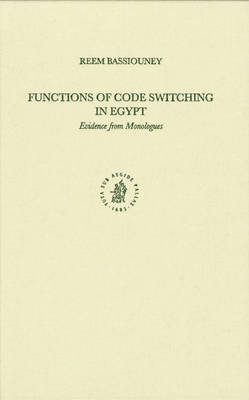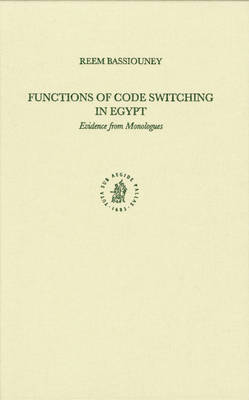
- Afhalen na 1 uur in een winkel met voorraad
- Gratis thuislevering in België vanaf € 30
- Ruim aanbod met 7 miljoen producten
- Afhalen na 1 uur in een winkel met voorraad
- Gratis thuislevering in België vanaf € 30
- Ruim aanbod met 7 miljoen producten
Zoeken
Omschrijving
This book reassesses theoretical approaches to diglossia and code-switching in the light of empirical data from Egypt. The work is based on a corpus of monologues that includes political speeches, mosque sermons and university lectures.
Part one is a detailed analysis of the systems of negation, deixis, and mood marking in Modern Standard Arabic and Egyptian Colloquial Arabic, with an emphasis on the occurrence and frequency of composite structures in empirical data.
This analysis provides the basis for an extensive reassessment of theoretical approaches to code-switching in part two; this reappraisal in turn leads to a thorough analysis of the function of code switching in the Egyptian speech community, and of the factors which influence code choice, such as role of the speaker, audience, and subject matter.
Part one is a detailed analysis of the systems of negation, deixis, and mood marking in Modern Standard Arabic and Egyptian Colloquial Arabic, with an emphasis on the occurrence and frequency of composite structures in empirical data.
This analysis provides the basis for an extensive reassessment of theoretical approaches to code-switching in part two; this reappraisal in turn leads to a thorough analysis of the function of code switching in the Egyptian speech community, and of the factors which influence code choice, such as role of the speaker, audience, and subject matter.
Specificaties
Betrokkenen
- Auteur(s):
- Uitgeverij:
Inhoud
- Aantal bladzijden:
- 272
- Taal:
- Engels
- Reeks:
- Reeksnummer:
- nr. 46
Eigenschappen
- Productcode (EAN):
- 9789004147607
- Verschijningsdatum:
- 11/11/2005
- Uitvoering:
- Hardcover
- Formaat:
- Genaaid
- Afmetingen:
- 160 mm x 244 mm
- Gewicht:
- 612 g

Alleen bij Standaard Boekhandel
+ 555 punten op je klantenkaart van Standaard Boekhandel
Beoordelingen
We publiceren alleen reviews die voldoen aan de voorwaarden voor reviews. Bekijk onze voorwaarden voor reviews.








